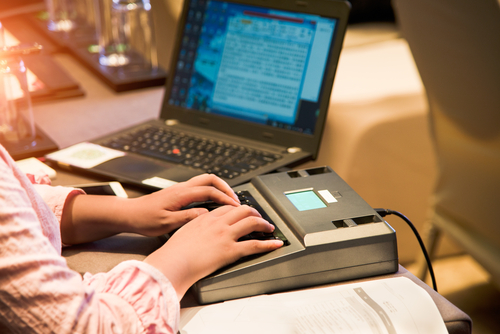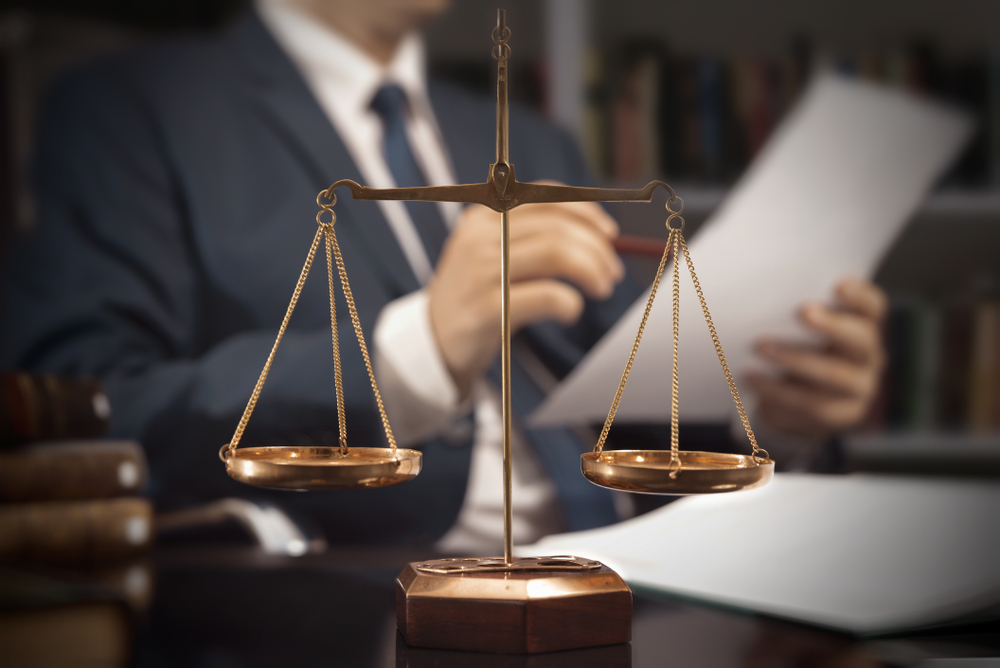In the bustling legal landscape of Miami, accuracy and transparency in legal proceedings are of paramount importance. And at the forefront of ensuring justice is the ever-vigilant court reporter. A court reporter plays a crucial role in capturing every word, gesture, and expression that takes place in the courtroom. Their meticulous attention to detail and lightning-fast typing skills enable them to produce accurate and verbatim transcripts that serve as an official record of proceedings.
With their specialized training and expertise, court reporters are adept at navigating complex jargon and deciphering fast-paced conversations, allowing them to capture every nuance and subtlety that may impact a case. Whether it’s a trial, deposition, or arbitration, they are the silent guardians of justice, ensuring that not a single word is lost or misunderstood.
In Miami’s diverse legal landscape, court reporters are well-versed in various industries and legal specialties, ranging from criminal law to corporate litigation. Their commitment to accuracy and professionalism contributes to the transparency of the judicial system, fostering trust and confidence among legal professionals, clients, and the general public alike.
So the next time you find yourself in a courtroom in Miami, remember the indispensable role of the court reporter, the unsung hero behind the scenes who plays a pivotal role in upholding the integrity of our legal system.

The Role of a Court Reporter
The primary responsibility of a court reporter is to create a verbatim record of legal proceedings. This encompasses everything from trials and hearings to depositions and arbitrations. By using specialized equipment, such as stenotype machines, they are able to transcribe spoken words into written text with incredible accuracy. Their role goes beyond mere transcription; they are tasked with capturing the nuances of dialogue, including tone, pauses, and even non-verbal cues. This serves to provide context that is often crucial for later interpretations of the proceedings.
Additionally, court reporters serve as impartial observers in the courtroom. Their neutrality is essential for maintaining the integrity of the legal process. They do not take sides; rather, they focus on accurately documenting what is said, ensuring that all parties have access to the same information. This impartiality helps to foster a fair legal environment where all voices are heard and respected. The transcripts they produce become vital documents that can be referenced in future legal actions, appeals, or settlements.
Moreover, court reporters often assist in managing courtroom logistics. They may collaborate with judges, attorneys, and other legal professionals to ensure that the proceedings run smoothly. This can involve managing exhibits, handling interruptions, and even summarizing proceedings for those who may arrive late. Their role is multifaceted, requiring not just technical skills but also strong interpersonal abilities that allow them to navigate the often-stressful courtroom environment effectively.
Importance of Accuracy and Transparency in Legal Proceedings
Accuracy in legal proceedings cannot be overstated; it is foundational to the very concept of justice. A single misheard word or misrepresented phrase can significantly alter the course of a case. Court reporters are tasked with the critical job of ensuring that every detail is captured precisely as it occurs. This meticulous attention to detail contributes to the transparency of the judicial process, helping to build public trust in legal outcomes. When the record is accurate, it serves as a reliable source for all parties involved, allowing them to review and understand the proceedings without ambiguity.
Transparency is equally essential in maintaining the integrity of the legal system. It ensures that all parties, including judges, attorneys, and the public, can see how decisions are made based on the evidence and testimony presented. Court reporters facilitate this by providing official transcripts that are accessible for review. This access helps to demystify legal proceedings, allowing citizens to understand the workings of the justice system and how their rights are protected.
Furthermore, in a diverse legal landscape like Miami, where various languages and cultures intersect, court reporters play a pivotal role in bridging communication gaps. They ensure that everyone involved understands the proceedings, regardless of language barriers or legal jargon. Their work allows for a fair and equitable system where justice is not only done but is also seen to be done, reinforcing the fundamental principles of democracy and accountability.
Court Reporter Qualifications and Training
To become a court reporter, individuals must undergo extensive training and education. This often begins with a specialized degree or certification from an accredited court reporting program. These programs typically cover essential topics such as legal terminology, transcription techniques, and the ethical obligations of a court reporter. Students learn how to operate stenographic equipment, which requires not only speed but also accuracy. Mastery of these skills is critical, as court reporters are often required to type at speeds exceeding 200 words per minute.
In addition to formal education, aspiring court reporters must also complete a certain number of hours in internships or supervised practice. This hands-on experience is invaluable as it allows students to apply their skills in real-world settings. During this time, they learn to handle the pressures of a courtroom environment, developing the ability to focus intensely while capturing rapid exchanges of dialogue. This experiential learning is what often sets successful court reporters apart from their peers.
Certification and licensure are also crucial steps in a court reporter’s career. In most jurisdictions, court reporters must pass a rigorous examination to demonstrate their proficiency and understanding of legal principles. This certification not only enhances their credibility but also increases their employability in a competitive field. Ongoing education is essential as well, as court reporters must stay updated on new technologies, changes in legal standards, and evolving industry practices to remain effective in their roles.
Tools and Technology Used by Court Reporters
Court reporters employ a variety of specialized tools and technologies to carry out their duties effectively. The most commonly used device is the stenotype machine, which allows them to type phonetic sounds rather than individual letters. This enables court reporters to capture spoken words at high speeds, greatly reducing the time and effort required to transcribe lengthy legal proceedings. Advanced stenographic software often accompanies these machines, providing features that enhance accuracy and efficiency.
In addition to stenotype machines, many court reporters utilize digital recording devices to supplement their work. These devices serve as a backup to ensure that no critical information is lost. They can record audio and video of the proceedings, which can then be synchronized with their transcripts for a more comprehensive record. This dual approach helps to provide an additional layer of security and accuracy, making it easier to reference specific moments in the proceedings.
Furthermore, the advent of transcription software has revolutionized the field of court reporting. Many reporters now use speech recognition technology that can translate spoken words into text in real-time. While this technology is still evolving and may not completely replace traditional methods, it offers significant benefits in terms of speed and efficiency. By integrating these tools into their workflow, court reporters can better meet the demands of a fast-paced legal environment while maintaining the high standards of accuracy required in their profession.
How Court Reporters Ensure Accuracy in Transcription
Ensuring accuracy in transcription is the cornerstone of a court reporter’s job. To achieve this, they employ several strategies that involve both proactive and reactive measures. One of the key techniques is thorough preparation before the proceedings begin. This includes reviewing case files, understanding legal terminology, and familiarizing themselves with the parties involved. By doing so, court reporters can anticipate the nature of the discussions and be better prepared to capture every detail accurately.
During the proceedings, court reporters utilize specialized note-taking techniques that allow them to focus on the flow of dialogue. They often employ shorthand and phonetic spelling to keep up with rapid exchanges while ensuring that the essence of the conversation is preserved. This skill requires years of practice and dedication, as even the smallest lapse in attention can lead to inaccuracies in the final transcript. Many reporters also develop their unique abbreviations for frequently used terms, further enhancing their efficiency.
After the proceedings, court reporters engage in a detailed review process. This involves proofreading their transcripts for errors, ensuring that all names are spelled correctly, and verifying that the legal terminology used is accurate. This quality control step is crucial, as it allows them to catch any mistakes before the transcripts are finalized and distributed. Additionally, many reporters collaborate closely with attorneys and judges, who may request clarifications or corrections, reinforcing the collaborative nature of their work.
The Impact of Court Reporting on Legal Outcomes
The role of court reporting extends beyond merely documenting proceedings; it can significantly influence the outcomes of legal cases. Accurate transcripts are crucial for appeals, as they provide a clear record of what transpired during the original trial. If a party believes that a legal error occurred, they can refer to the transcript to substantiate their claims. In this way, court reporters serve as guardians of the judicial process, ensuring that the integrity of legal proceedings is upheld.
Moreover, the clarity provided by accurate court transcripts can aid in settlement negotiations. Lawyers often rely on these documents to assess the strength of their case and to determine the likelihood of success in court. A well-documented record can facilitate discussions and lead to more informed decision-making, potentially resulting in settlements that are fair and equitable for all parties involved. This highlights the central role that court reporters play in promoting justice and fairness within the legal system.
Additionally, the presence of a skilled court reporter can contribute to a more efficient legal process. When all parties have access to accurate, timely transcripts, it reduces the likelihood of disputes regarding what was said or agreed upon during proceedings. This clarity can streamline the legal process, minimizing delays and ensuring that cases are resolved more efficiently. Consequently, the work of court reporters can have a lasting impact on the overall effectiveness of the judicial system.

Challenges Faced by Court Reporters in Miami
Court reporters in Miami encounter a variety of challenges unique to their environment. One major issue is the fast-paced nature of legal proceedings, especially in a bustling legal hub like Miami. The rapid exchange of information can be overwhelming, requiring court reporters to maintain an exceptional level of concentration and skill. In high-stakes trials where emotions run high, the pressure to accurately capture every word can be intense, leading to potential stress and fatigue.
Another considerable challenge is the diverse linguistic landscape of Miami. Many court reporters are required to work in multilingual settings, where witnesses may speak Spanish, Creole, or other languages. This necessitates a strong command of legal terminology in multiple languages, as well as the ability to accurately transcribe different dialects. Court reporters must often collaborate with interpreters, adding another layer of complexity to their work while ensuring the integrity of the transcript remains intact.
Furthermore, the rapid advancement of technology poses both opportunities and challenges for court reporters. While new tools can enhance productivity and accuracy, they also require ongoing training and adaptation. Court reporters must stay informed about the latest technologies and trends in the industry to remain competitive. Balancing traditional skills with technological advancements can be daunting, but it is essential for maintaining the high standards expected in the legal field.
The Benefits of Hiring a Court Reporter in Miami
Hiring a court reporter in Miami offers numerous benefits for attorneys, clients, and the legal system as a whole. One of the most significant advantages is the assurance of accuracy and reliability in documentation. A qualified court reporter will provide an official transcript that captures every detail of the proceedings, reducing the risk of miscommunication or misunderstandings. This accuracy is particularly crucial in complex cases, where every word can have legal implications.
Another benefit is the professional expertise that court reporters bring to the table. Their specialized training equips them with not only the technical skills needed for transcription but also a deep understanding of legal processes. This expertise allows them to navigate courtroom dynamics effectively, ensuring that proceedings run smoothly and that all parties are adequately represented. Their presence can also alleviate some of the burdens on attorneys, allowing them to focus on their legal strategies rather than the minutiae of documentation.
Moreover, the use of court reporters enhances the overall transparency and credibility of the legal process. When official transcripts are available, it fosters public trust in the judicial system. Clients and legal professionals alike can feel confident that they are operating within a framework that values accuracy and fairness. In a diverse and complex legal environment like Miami, the role of a court reporter is essential in maintaining the integrity and transparency of legal proceedings.
Conclusion: The Invaluable Role of Court Reporters in the Legal System
In conclusion, court reporters play an invaluable role in the legal system, particularly in a vibrant and diverse city like Miami. Their commitment to accuracy and transparency ensures that legal proceedings are documented faithfully, providing a reliable record that serves as a foundation for justice. By capturing every word, tone, and nuance of courtroom dialogue, they facilitate a fair and equitable legal process.
Moreover, the challenges they face, from the fast-paced nature of the courtroom to the complexities of multilingual environments, highlight their resilience and adaptability. Their ongoing commitment to professional development and mastery of technology ensures that they remain at the forefront of the legal field, ready to meet the evolving demands of the judicial system.
As unsung heroes in the legal landscape, court reporters deserve recognition for their essential contributions. They are the silent guardians of justice, ensuring that every voice is heard and every detail is preserved. The next time you find yourself in a courtroom, take a moment to appreciate the crucial role that court reporters play in upholding the integrity of our legal system. Their work not only impacts the cases they document but also reinforces the fundamental principles of justice, accountability, and transparency that are vital to a thriving democracy.



